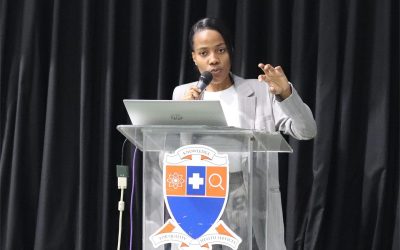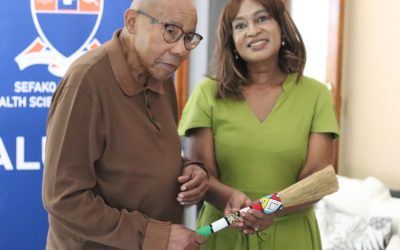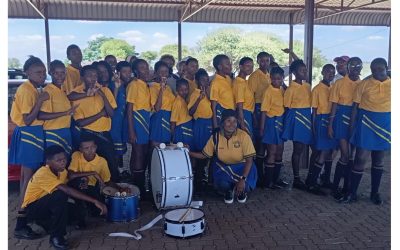A new era of healthcare education has begun at Sefako Makgatho Health Sciences University (SMU). Fifty-six second-year nursing students recently participated in Africa’s first virtual reality (VR)–based assessment, a ground-breaking pilot that redefines how future healthcare professionals are trained. SMU’s initiative demonstrates a bold commitment to innovation, blending technology and education to prepare students for the demands of modern clinical practice.
 The Department of Nursing, in partnership with Rekindle Learning and SMU’s Centre for University Teaching and Learning (CUTL), introduced students to a fully immersive VR experience. In a safe, controlled environment, learners applied theoretical knowledge to simulated real-world scenarios. From the first moment, the atmosphere was electric, students engaged actively, made clinical decisions, and honed skills in ways traditional assessments cannot match.
The Department of Nursing, in partnership with Rekindle Learning and SMU’s Centre for University Teaching and Learning (CUTL), introduced students to a fully immersive VR experience. In a safe, controlled environment, learners applied theoretical knowledge to simulated real-world scenarios. From the first moment, the atmosphere was electric, students engaged actively, made clinical decisions, and honed skills in ways traditional assessments cannot match.
“VR is more than a novel tool; it challenges students to think differently and enhances their confidence as practitioners,” said Thandokazi Ikedinobi, Manager of the eLearning and Instructional Technologies Unit at CUTL. Students embraced the technology with enthusiasm, demonstrating adaptability and eagerness to explore this new dimension of learning.
For the School of Health Care Sciences (SHCS), the programme is a source of pride. Dr Vuyokazi Soga, School Operations Manager, highlighted the significance of being the first African university to implement VR-based assessments. “This pilot is a testament to visionary leadership and a commitment to equipping students for the evolving realities of healthcare,” she noted.
 Rekindle Learning’s Chief Executive Officer (CEO), Sally Nhlanhla, echoed the sentiment, emphasising the broader vision: to make VR a mainstream educational tool across Africa. “Partnering with SMU allows us to empower students not just with knowledge, but with the tools to shape the future of healthcare delivery,” she said.
Rekindle Learning’s Chief Executive Officer (CEO), Sally Nhlanhla, echoed the sentiment, emphasising the broader vision: to make VR a mainstream educational tool across Africa. “Partnering with SMU allows us to empower students not just with knowledge, but with the tools to shape the future of healthcare delivery,” she said.
Though currently focused on nursing, the potential of VR assessments extends across disciplines. Feedback from students, lecturers, and administrators will refine the programme and may pave the way for adoption in pharmacy, dentistry, and medicine. If scaled, VR could become a cornerstone of SMU’s teaching model, offering risk-free, engaging, and accelerated learning experiences that bridge the gap between theory and practice.
What sets this achievement apart is not only the technology itself but the culture of support within the Department of Nursing. The presence of the full team during the assessments reflected a dedication to excellence, innovation, and student development. By embracing new teaching methods and standing alongside learners, the department set a benchmark in leadership that inspires both students and colleagues.
This milestone signals more than innovation—it represents a bold statement that African universities can lead in redefining education through technology. For the 56 nursing students who participated, the experience extends beyond the VR headset: it equips them with practical skills, confidence, and a pioneering spirit that will guide their journey as healthcare professionals.
SMU’s VR pilot marks a transformative step in African higher education, showing that when ambition meets technology, learning is limited only by imagination.
By Dimakatso Modise



